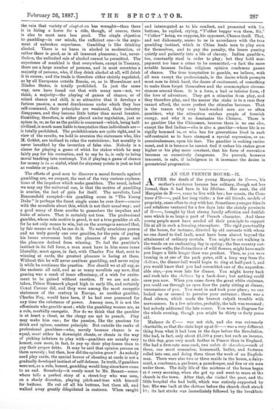AN OLD FRENCH HOUSE.—II.
AFTER the death of the young Marquis de C—, his mother's existence became less solitary, though not less formal, than it had been in his lifetime. Her aunt, the old Marquise de B—, came to live with her ; her cousin, the Com- tense d'O—, paid her long visits ; a few old friends, models of propriety, came often to stay with her. Sometimes younger friends and relations ventured for a few days into the stately precincts of Cr—, brought by that strong family affection and dutiful- ness which is so large a part of French character. And these young people must have needed all their principle to support life at all in such a freezing atmosphere. The rigid punctuality of the house, for instance, directed by old servants with whom no one dared to find fault, must have been almost beyond the attainment of ordinary mortals. You might be out walking in the woods on an enchanting day in spring; the free country out- side those walls, the distractions of wild flowers, might have made you linger a little longer than was prudent. Then, as you were turning in at one of the park gates, still a long way from the chateau, the dinner-bell would begin to ring at half-past 5, and you would know that you had committed one of the unpardon- able SillP,—yon were late for dinner. You might hurry back and rush into the duiteau by a back-door ; but nothing could save you now. When you came down the great white staircase, you could see through an open door the party sitting at dinner, unconscious of you. You went in and took your place ; no one looked up or seemed to perceive your entrance ; there was a dead silence, which made the bravest culprit tremble with nervousness. In a few minutes, probably, the talk was resumed ; but nobody addressed the late comer. You were in disgrace for the whole evening, though you might be thirty or forty years old.
Madame de C— was not rich, and she was extremely charitable, so that the state kept up at G— was a very different thing from what it had been in the days before the Revolution. She had, in fact, only about £1,500 a year; but such an income, to this day, goes very much farther in France than in England. She had a first-rate man.cook, two valets do chantbre,—each of these, one must remember, housemaid, butler, and footman rolled into one, and doing three times the work of an English- man. There were also two or three maids in the house, a dairy- maid, a coachman, a gardener, gamekeeper, and five or six men under them. The daily life of the mistress of the house began at 6 every morning, when she got up and went to mass at the church in the town. After that, she visited the poor, and the little hospital she had built, which was entirely supported by her. She was back at the Ail Mau before the church clock struck 10; its last stroke was immediately followed by the breakfast.
bell, and then, for what reason I do not know, the church clock struck the hour a second time. After breakfast, the Marquise and her guests went into the salon, cold and bare as it has been described, its only relics of splendour being the very fine family portraits, and the beautiful carving of the panelled walls. Here the ladies were all obliged to sit at needlework till 2 o'clock ; and the men staying in the chilteau, if they were well behaved, sat there too, and entertained the ladies ; but, not unnaturally, they very often found this too much for them, and escaped to the outer world. At 2 the morning's bondage ended ; people scattered and did what they pleased. Madame de C— went to her own affairs ; sometimes she took a drive with one or two congenial spirits. After dinner, which was at hall-past 5, the poor ladies sat down again to their needlework, the rebellions men escaping to smoke, if they could manage it without being found out, for one can easily understand that smoking was not a practice encouraged at G—. At 9 o'clock, the whole party played a round game, and this lasted till the clock struck 10, when the Marquise wished her friends good-night. Then they all lighted the candles in their flat candlesticks, and set off to bed.
All this sounds dismal enough, but the place and the life had their redeeming features too. The house had a kind of historic grandeur and beauty mingled with its sadness,—for certainly it was sad; the shadow of its mistress's sorrow hanging over it like a cloud. Yet the talk was often most cheerful and agreeable, as it could not fail to be among well.bred French people, and the warm sun shone on the great white walls, and streamed into the high rooms, and along the broad red corridors hang with pictures of the past. Outside, too, the place had its beauty ; on the south terrace were two rows of fine, bushy orange-trees, tall and stately like the house; and in the park below, green and bright and shady, the long avenues of trees seemed to lead to unknown distances; they, and the beautiful mysterious charmilles in fell foliage, seemed like the approaches to some hidden fairy palace. Then, not all Madame de C—'s friends and companions were of the same ascetic spirit as herself. The younger guests at the chciteau used to fly for sympathy and amusement to the oldest person in the house, who yet was the youngest and merriest, the Marquise de B—. In her little apartment at one end of the chtiteau, she used to sit and tell her stories, recollections of her long life, which would have been quite impossible in the drawing-room, in the hearing of Madame de 0—. Her father was an Austrian noble, and she had royal blood in her veins. About the year 1785, he enraged his family by falling in love with France and a French lady, gave up a brilliant marriage they had arranged for him, bought large estates in France, and wished to spend the rest of his life there. But the Revolution interfered with that. He and his wife were living in Paris with their little girl, who was about four years old. One day she was sent out driving in her mother's berline, with servants to take care of her, when the carriage was stopped by a mob, who seized the little girl, perched her on the ear of the Goddess of Reason, and drove her about all day in triumph. The little lady herself enjoyed this adventure im- mensely; but it was too much for her father and mother. Having got their child back, which they did not succeed in doing till the next day, they immediately left Paris, and took refuge at the Court of Hungary, where their child was brought up ; and many stories, more amusing than edifying, she had to tell of her young days. In the end, she married a French migre, the Marquis de B—, and so came back to France. They succeeded in getting back some part of their property, but had very little money. Madame de B— used to tell that, after her arrival in her husband's half-ruined clateau, she had been trying to find a woman as cook, at very low wages, when one day an oldish man came to offer himself. She answered,—" Impossible; none sommes ruin6s, et je no cherche qn'ane tres modeste cuieinibre. Se ne pourrais pas payer an cuisinier." "Oh, madame la Marquise," said the man, " j'ai 6t6 is cnisinier de Madame Dabarry, et je ne pease pas me rdsigner it entrer dans une maison ordinaire. Si vons vonlez me prendre, j'aime miens yeas servir sans gages!" Madame de B— had lost her husband and two sons, and was left alone in the world, before she came to live with her niece ; but she had not lost her wit and fan, or her love of the world and its ways, and she certainly was a foreign element in the Chittean de G—. While she lived there, it was at least possible to laugh ; and the young relations perhaps found the old aunt's stories not less delightful because they were stolen pleasures, like smoking, quite shut out from the great rooms downstairs.
But I must not linger on these recollections of days which look actually bright in contrast with the deeper twilight that fol- lowed them. Madame de B— died a very old woman, lively and charming to the last. The old friends passed away one by one, leaving the Marquise much more lonely, and then, the last great trouble of her life, came the war of 1870. A battle was fought close by, the little town was occupied, and the Prussian General quartered himself and his officers in the chclteau, with his artillery in the park. The poor Marquise, though treated afterwards with great respect, received a shock on the first day which she never recovered. The first soldier who entered the chateau took her roughly by the shoulders and pushed her aside. She was able and ready, however, to devote herself to the care of the wounded, and when the Germans had left, taking her horses with them, she turned the house into a hospital. She also nursed the many victims of the small-pox, which broke out with great violence towards the end of the war. A faithful friend, who came to her as soon as the state of the country would allow, found her strangely changed from her former self. Her spirit was broken, the old sternness and stiff- ness were gone, and she had become quite gentle and affectionate. But all the old life was over; each year as it went by, as the Marquise gradually failed in body and mind, seemed sadder to those who went there to visit and watch over her.
A visit to G— in winter,—it was something formidable of its kind. As I have said, the place was remote from railroads ; and this visit began with a drive of more than thirty miles, twelve miles of which went straight through one of the forests of that country. And a drive through such a forest in summer is beautiful and charming enough ; but in the dark, grey winter, it is a very dreary experience. The carriage hardly ever met a single living thing : a stray huntsman, perhaps, or a party of woodcutters, or a frightened deer rushing into a thicket. And then G— itself,—the old servants dead or in second childhood, their mistress failing fast, the doors in the corridor all shut, the damp alleys of the park deserted. Cold winds blew straight through the house, which stands on a hill, and it required some courage to come out of one's room, wrapped in shawls, and walk along the freezing, silent passages, and down to the great empty balls below, where immense wood fires blazing up the chimneys only seemed, in some mysterious way, to make the house more lonely stilL
It is all over now. G— has passed into other and younger hands; the Marquise is at rest. Perhaps, when another cen- tury has gone by, another chapter in the history of the old house —more or less eventful, who knows P—may be told from another



































 Previous page
Previous page